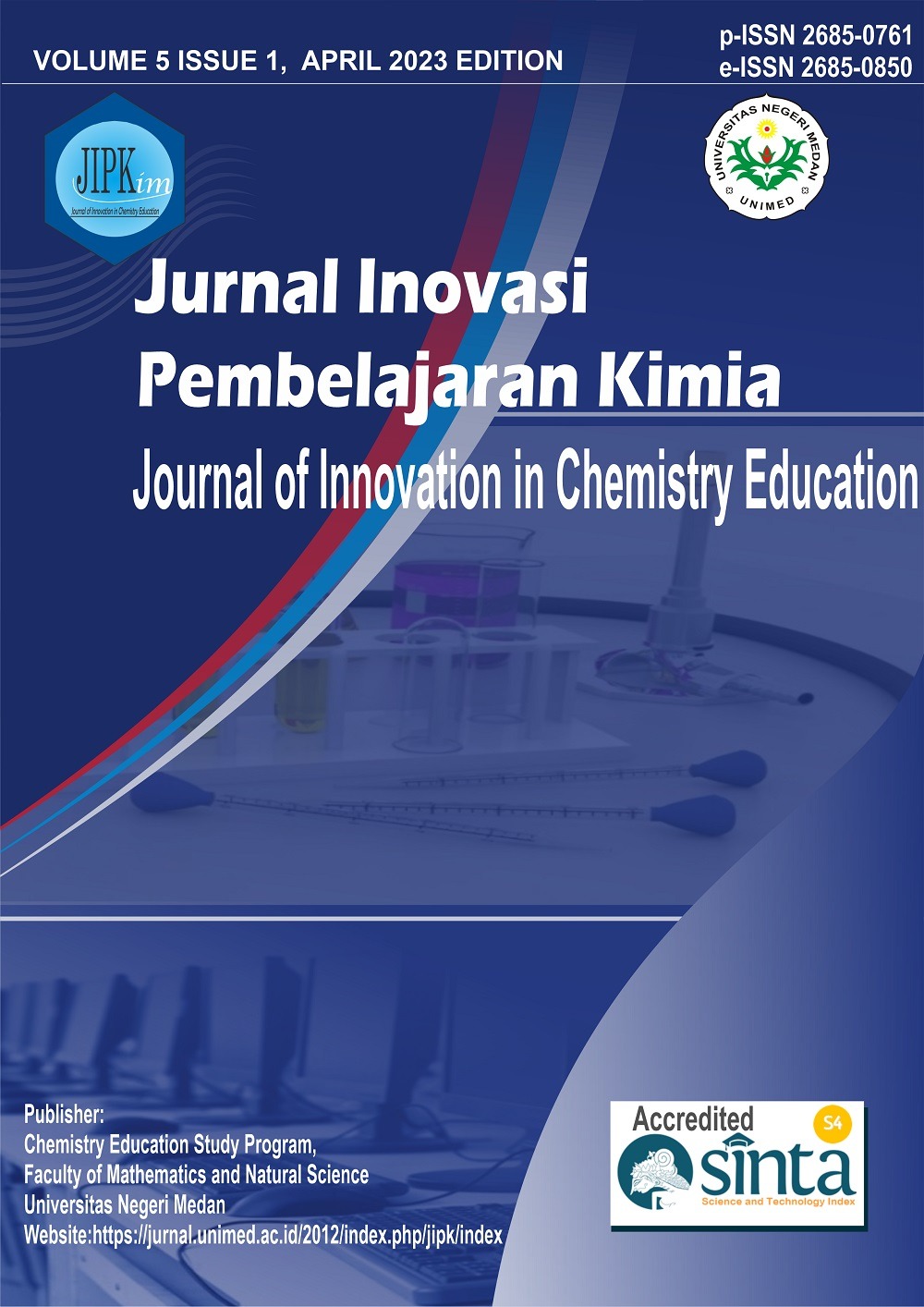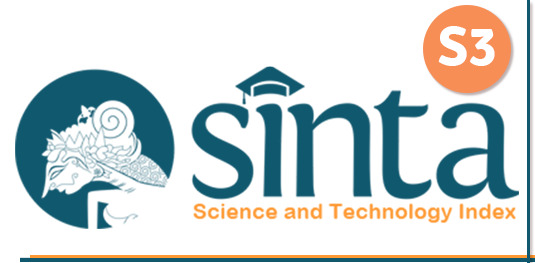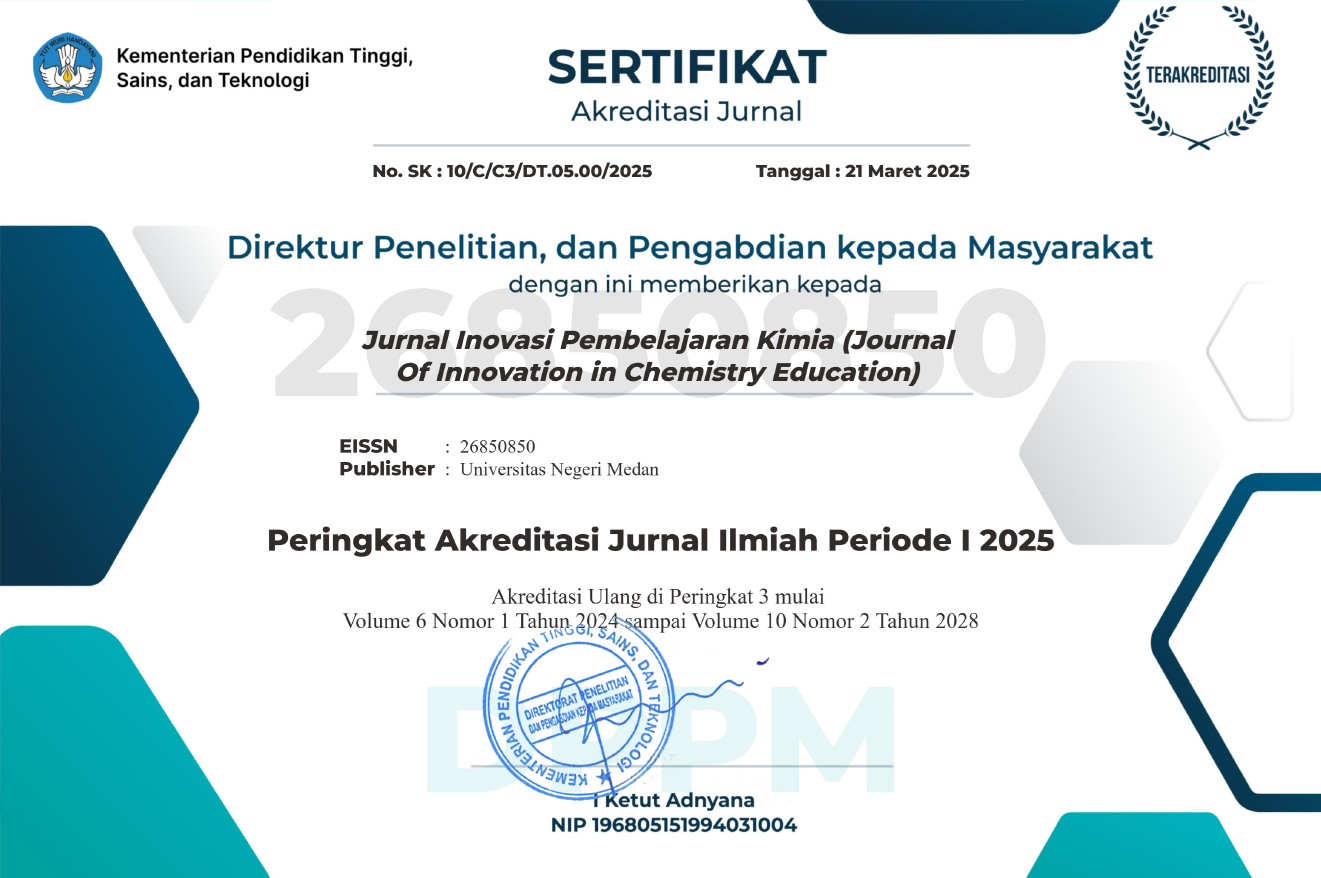Development of Handout Android-Based Application on Buffer Solution using Discovery Learning Model
DOI:
https://doi.org/10.24114/jipk.v5i1.44516Keywords:
Android Application, Handouts, Buffer SolutionsAbstract
Research and development aims to produce Handout Buffer Solution on a quality Android Application. Quality is seen based on the validity, practicality, and effectiveness. Based Buffer Solution Handout Refers to the ADDIE (Analysis, Design, Development, Implementation, and Evaluate) development model. The instruments used for validity are validation sheets by theory experts and media experts, practicality teacher response questionnaires and students, and the effectiveness of the learning outcomes test. The results of the research show: 1) the validity of the Handout from the theory expert 3.65 and the media expert 3.58 with a very valid category, 2) the average percentage of practicality of the handout based on the teacher's response questionnaire equal to 91% and 87.58% of students in the very practical category, 3) the valid handouts that fulfill the effective criteria (≥ 85%) based on the achievement of class completeness with a percentage of 86.1 %. Thus, it can be concluded that the Handout Buffer solution Based on Android Application development with the ADDIE Model is very valid, very practical, and effective for use in the learning process.References
Akbar, S. 2013. Learning Device Instruments. Bandung: PT Juvenile Rosdakarya Oft.
Arief, Maipha Deapati., Army Auliah., and Hardin. 2021. Development of an E-Magazine for Reduction and Oxidation Reactions as a Chemistry Learning Media for Class X SMA/MA. Journal of Chemistry Learning Innovation. Vol.3, No.2.
Arikunto, S. 2016. Research Procedures A Practice Approach. Jakarta: Rineka Cipta.
Arshad, Azhar. 2011. Teaching Media. Jakarta: Rajawali Press.
Arshad, Azhar. 2015. Teaching Media. Jakarta: Rajawali Press.
Batubara, Hamdan Husein. 2020. Effective Learning Media. Semarang: Fatawa Publishing.
Ministry of Education and Culture. 2001. Big Indonesian Dictionary. Jakarta: Balai Pustaka.
Hasanah. 2020. Analysis of Student Online Learning Activities in the Covid-19 Pandemic. Education Journal. Vol.1, No.1.
Hayati, S., Agus SB, and Erfan H. 2015. Development of Physics Flipbook Learning Media to Improve Student Learning Outcomes. Proceedings of the National Seminar on Physics (E-Journal) SNF. Vol.4.
Hutahaean, Lidia Aprileny., Siswandari., Harini. 2019. Utilization of Interactive E-Modules as Learning Media in the Digital Age. Proceedings of the UNIMED Postgraduate Education Technology National Seminar. ISBN: 978-623-92913-0-3.
Istiana, GA., Catur Saputro., Sukardjo JS. 2015. Application of the Discovery Learning Learning Model to Increase Learning Activity and Achievement on the Subject of Buffer Solutions for Class XI IPA Semester II Students of SMA Negeri 1 Ngamplak, Academic Year 2013/2014. Journal of Chemistry Education Univ Eleven March. Vol.4.
Kurniasih, Imas and Berlin Sani. 2014. Implementation of the 2013 Curriculum Concept and Application. Surabaya: Pen Says.
Meliawati, R. 2019. Understanding the Concept of Atomic Radius and Electronegativity in Chemistry Education Students Semester IV 2016/2017 Academic Year Learning Outcomes Using the Discovery Learning Model. Kanderang Tingang Scientific Journal. Vol.10, No.1.
Mujahideen. 2019. Comparative Analysis of Teacher Centered and Learner Centered. Journal of Pedagogy. Vol.2, No.2.
Muliawati, DI 2016. Development of Team Assisted Individualization (TAI)-Based Handouts to Improve Student Achievement on Ethanol Manufacturing Materials at Industrial Chemistry Vocational High School Laboratory Scale. INQUIRY Journal.
Mulyatiningsih, Endang. 2008. Applied Research Methods in Education. Bandung: Alphabet.
Munir. 2009. Information and Communication Technology-Based Distance Learning. Bandung: Alphabet.
Mustaming, Akhmad., Mochmad Cholik., Luthfiyah Nurlaela. 2015. Development of Learning Devices to Improve the Clutch Unit and its Operating System Components with the Discovery Learning Model to Improve Student Learning Outcomes in Class XI Automotive at SMK Negeri 2 Tarakan. Journal of Vocational Education: Theory and Practice. Vol.3, No.1.
Nana. 2022. Development of Teaching Materials for Physics Education Based on the POE2WE Learning Model. Klaten: Lakeisha.
Nugrahaeni, A. I Wayan, R and I Made AR 2017. Application of the Discovery Learning Learning Model to Improve Critical Thinking Skills and Chemistry Learning Outcomes. Journal of Indonesian Chemistry Education. Vol.1, No.1.
Prastowo, A. 2011. Creative Guide to Making Innovative Teaching Materials. Yogyakarta: DIVA Press.
Saputro, Budiyono. 2011. Development Research Management (Research & Development). Yogyakarta: Aswaja Pressindo.
Satyaputra and Aritonang. 2014. Beginning Android Programming with ADT Bundle. Jakarta: Elex Media Komputindo.
Side, Sumiati, Hardin, and Munir Tanrere. 2013. Application of the Continuous Discussion Method in Chemistry Subjects to Increase the Activeness and Learning Outcomes of Class XI IPA Students at SMA Negeri 11 Makassar. Journal of Chemistry.
Sunart, Sri. 2020. Learning Media during the Covid-19 Pandemic. Journal of Educational Sciences.
Susanto, H and Akmal, H. 2018. The Effectiveness of Using Mobile Smartphone-based Learning Applications as a Media for Introduction to Local History During the Physical Revolution in South Kalimantan for High School Students. Journal of History Education Study Program. Vol.6, No.2.
Yunitasari, Wahyu, Endang Susilowati, Nanik Dwi Nurhayati. 2013. Direct Instruction Learning accompanied by a Hierarchy of Concepts to Reduce Students' Misconceptions on Material Solutions for Class XI IPA Academic Year 2012/2013. Journal of Chemistry Education. Vol.2, No.3.













